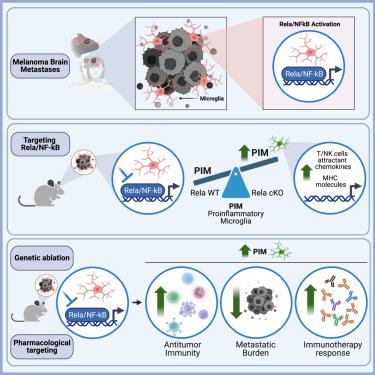Microglial reprogramming enhances antitumor immunity and immunotherapy response in melanoma brain metastases
IF 48.8
1区 医学
Q1 CELL BIOLOGY
引用次数: 0
Abstract
Melanoma is one of the tumor types with the highest risk of brain metastasis. However, the biology of melanoma brain metastasis and the role of the brain immune microenvironment in treatment responses are not yet fully understood. Using preclinical models and single-cell transcriptomics, we have identified a mechanism that enhances antitumor immunity in melanoma brain metastasis. We show that activation of the Rela/Nuclear Factor κB (NF-κB) pathway in microglia promotes melanoma brain metastasis. Targeting this pathway elicits microglia reprogramming toward a proinflammatory phenotype, which enhances antitumor immunity and reduces brain metastatic burden. Furthermore, we found that proinflammatory microglial markers in melanoma brain metastasis are associated with improved responses to immune checkpoint inhibitors in patients and targeting Rela/NF-κB pathway in mice improves responses to these therapies in the brain, suggesting a strategy to enhance antitumor immunity and responses to immune checkpoint inhibitors in patients with melanoma brain metastasis.

求助全文
约1分钟内获得全文
求助全文
来源期刊

Cancer Cell
医学-肿瘤学
CiteScore
55.20
自引率
1.20%
发文量
179
审稿时长
4-8 weeks
期刊介绍:
Cancer Cell is a journal that focuses on promoting major advances in cancer research and oncology. The primary criteria for considering manuscripts are as follows:
Major advances: Manuscripts should provide significant advancements in answering important questions related to naturally occurring cancers.
Translational research: The journal welcomes translational research, which involves the application of basic scientific findings to human health and clinical practice.
Clinical investigations: Cancer Cell is interested in publishing clinical investigations that contribute to establishing new paradigms in the treatment, diagnosis, or prevention of cancers.
Insights into cancer biology: The journal values clinical investigations that provide important insights into cancer biology beyond what has been revealed by preclinical studies.
Mechanism-based proof-of-principle studies: Cancer Cell encourages the publication of mechanism-based proof-of-principle clinical studies, which demonstrate the feasibility of a specific therapeutic approach or diagnostic test.
 求助内容:
求助内容: 应助结果提醒方式:
应助结果提醒方式:


